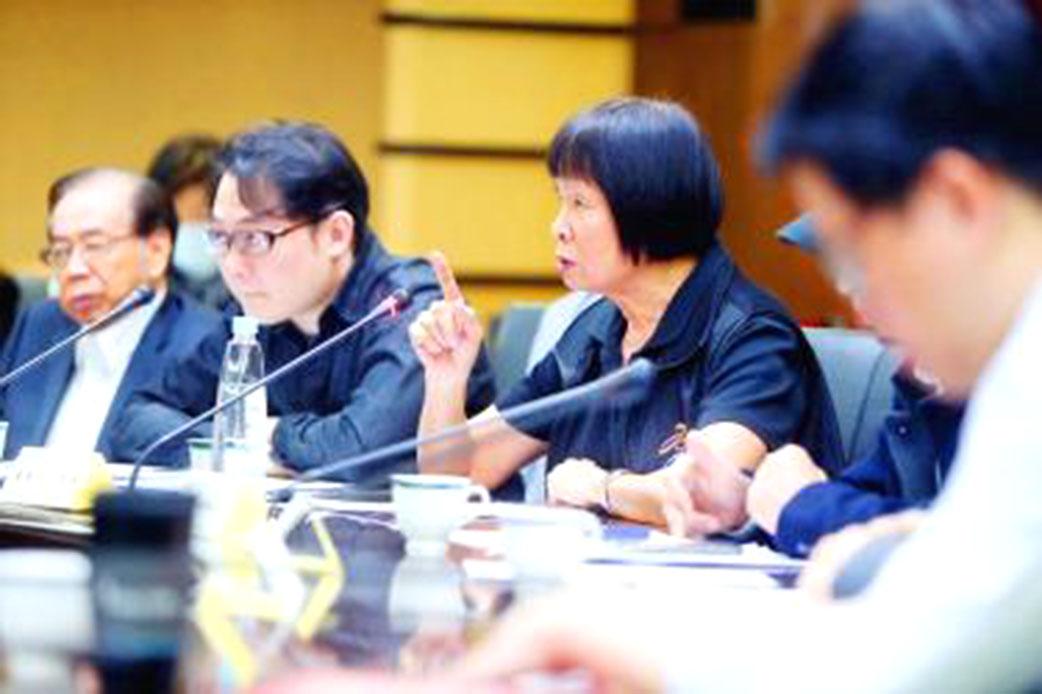Advocacy groups have called for the national team to compete under the name “Taiwan” at the Tokyo Olympics, while former Olympian Chi Cheng (紀政) has launched another referendum petition on the issue.
Taiwanese athletes have performed outstandingly at the Olympics and have raised the nation’s profile on the world stage, Northern Taiwan Society chairman Lee Chuan-hsin (李川信) said on Friday.
“Many foreign news agencies, including Japan’s NHK, have called our delegation ‘Taiwan’ instead of ‘Chinese Taipei.’ Therefore our own people and politicians should also speak of ‘Team Taiwan’ and Taiwanese athletes,” he said.

Photo: CNA
“However, in Taiwan, most of the time the Taiwanese team is still referred to as Team Zhonghua (中華, Chinese). We see the medal-winning athletes returning home and holding media briefings at the airport without any wording, symbols or logos to represent Taiwan,” he added.
The advocates released a joint statement, expressing their gratitude to the international community for supporting the nation’s athletes, but added that “it shows the need to avoid a mix-up, as some have mistaken Taiwanese athletes as coming from China.”
“Therefore we are organizing the ‘Call Us Team Taiwan, Let’s Go Taiwan’ drive, and we urge people to join us,” the statement said.
The drive urges people to produce their own “Call Us Team Taiwan” posters, sign boards and adverts to show the world they feel proud to support Taiwanese athletes.
The groups also called on Taiwanese politicians and public figures to support “Team Taiwan,” and not to refer to it as “Chinese Taipei” anymore.
Among the groups promoting the drive are the Taiwan Society, the Asia-Pacific Liberal Women Association and the Taiwan Association of University Professors, as well overseas organizations, including the All Japan Taiwanese Union, the Friends of Taiwan Association Japan, the World Federation of Taiwanese Associations and the Taiwanese Association of America.
Meanwhile, Chi has this week announced that she would launch another referendum campaign next year to rectify the national team’s name by changing it to “Team Taiwan,” adding that she aims to have the proposed referendum ready for the 2024 Paris Olympics.
“Taiwanese do not want the athletes representing their nation to be called ‘Chinese Taipei’ when they are competing or walking to the podium to receive an Olympic medal,” said Chi, who competed in three Olympic Games: Rome in 1960, Tokyo in 1964 and Mexico in 1968.
Chi was among the leading advocates of a referendum in 2018 that called for changing the national team’s name to “Team Taiwan” for the Tokyo Olympics.
At the time, the Chinese Taipei Olympic Committee asked people to vote “no,” saying that the nation’s athletes cannot go abroad to compete under the name “Taiwan” and it would ruin their careers.
The 2018 referendum asked: “Do you agree that the nation should apply under the name of ‘Taiwan’ for all international sports events, including the 2020 Tokyo Olympics?”
It garnered 5,774,556 “no” votes (52.3 percent) and 4,763,086 “yes” votes (43.1 percent).

A magnitude 5.6 earthquake struck off the coast of Yilan County at 12:37pm today, with clear shaking felt across much of northern Taiwan. There were no immediate reports of damage. The epicenter of the quake was 16.9km east-southeast of Yilan County Hall offshore at a depth of 66.8km, Central Weather Administration (CWA) data showed. The maximum intensity registered at a 4 in Yilan County’s Nanao Township (南澳) on Taiwan’s seven-tier scale. Other parts of Yilan, as well as certain areas of Hualien County, Taipei, New Taipei City, Taoyuan, Hsinchu County, Taichung and Miaoli County, recorded intensities of 3. Residents of Yilan County and Taipei received

Taiwan has secured another breakthrough in fruit exports, with jujubes, dragon fruit and lychees approved for shipment to the EU, the Ministry of Agriculture said yesterday. The Animal and Plant Health Inspection Agency on Thursday received formal notification of the approval from the EU, the ministry said, adding that the decision was expected to expand Taiwanese fruit producers’ access to high-end European markets. Taiwan exported 126 tonnes of lychees last year, valued at US$1.48 million, with Japan accounting for 102 tonnes. Other export destinations included New Zealand, Hong Kong, the US and Australia, ministry data showed. Jujube exports totaled 103 tonnes, valued at

TRUST: The KMT said it respected the US’ timing and considerations, and hoped it would continue to honor its commitments to helping Taiwan bolster its defenses and deterrence US President Donald Trump is delaying a multibillion-dollar arms sale to Taiwan to ensure his visit to Beijing is successful, a New York Times report said. The weapons sales package has stalled in the US Department of State, the report said, citing US officials it did not identify. The White House has told agencies not to push forward ahead of Trump’s meeting with Chinese President Xi Jinping (習近平), it said. The two last month held a phone call to discuss trade and geopolitical flashpoints ahead of the summit. Xi raised the Taiwan issue and urged the US to handle arms sales to

BIG SPENDERS: Foreign investors bought the most Taiwan equities since 2005, signaling confidence that an AI boom would continue to benefit chipmakers Taiwan Semiconductor Manufacturing Co’s (TSMC, 台積電) market capitalization swelled to US$2 trillion for the first time following a 4.25 percent rally in its American depositary receipts (ADR) overnight, putting the world’s biggest contract chipmaker sixth on the list of the world’s biggest companies by market capitalization, just behind Amazon.com Inc. The site CompaniesMarketcap.com ranked TSMC ahead of Saudi Aramco and Meta Platforms Inc. The Taiwanese company’s ADRs on Tuesday surged to US$385.75 on the New York Stock Exchange, as strong demand for artificial intelligence (AI) applications led to chip supply constraints and boost revenue growth to record-breaking levels. Each TSMC ADR represents